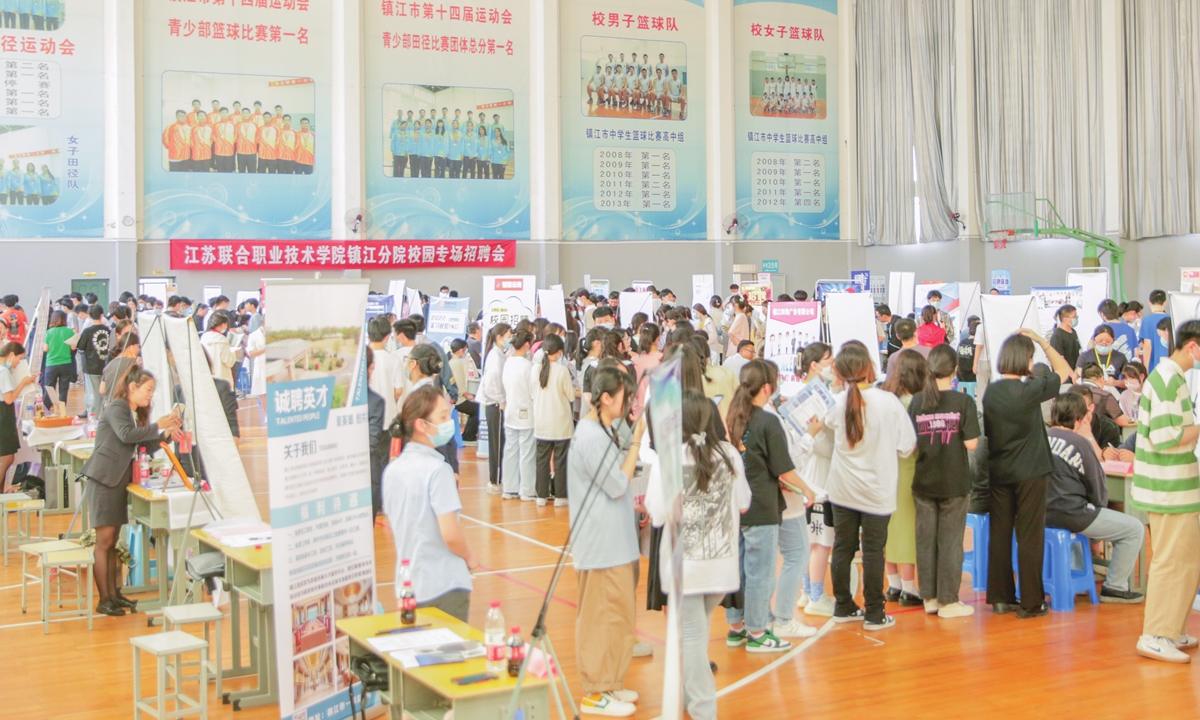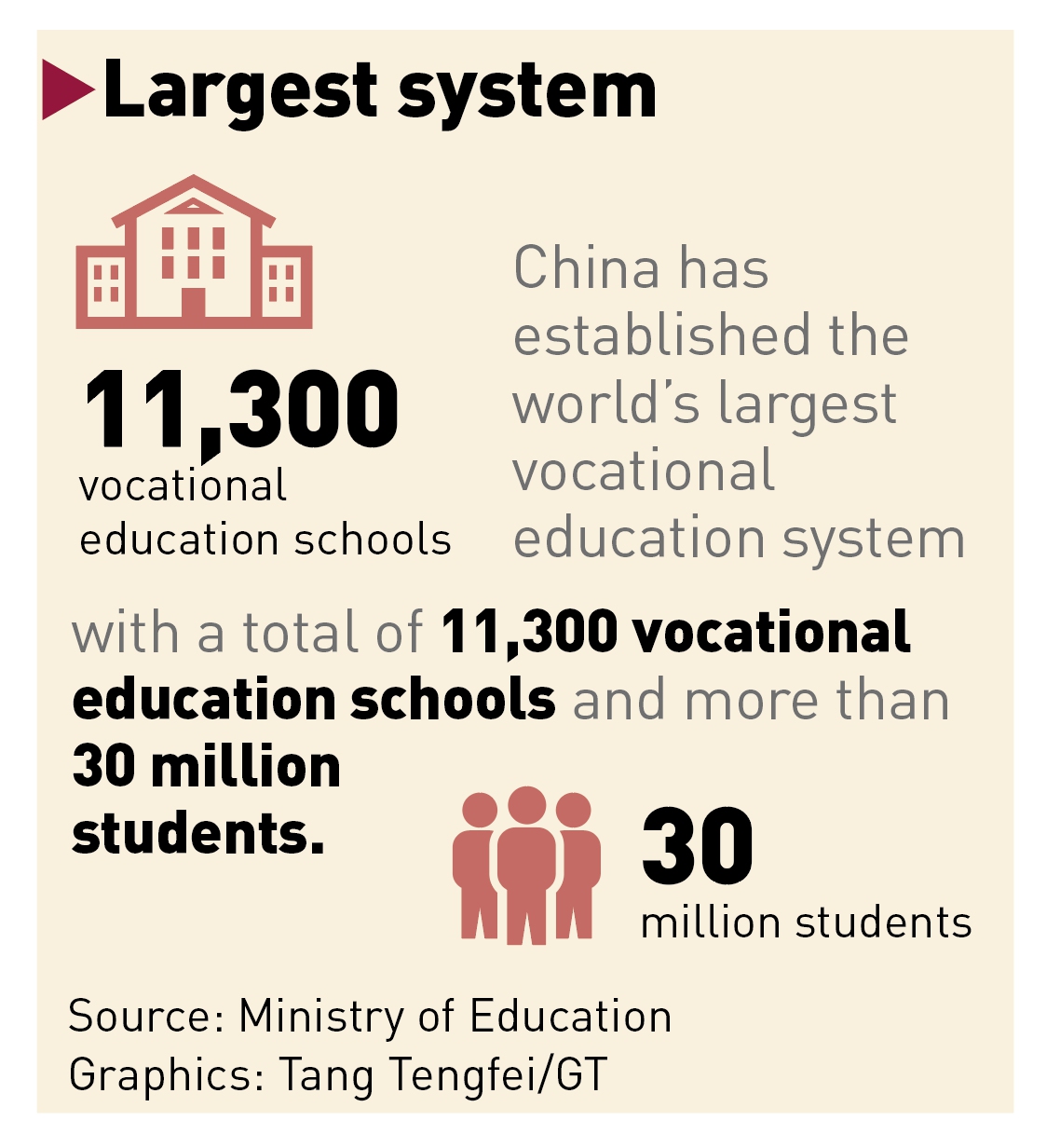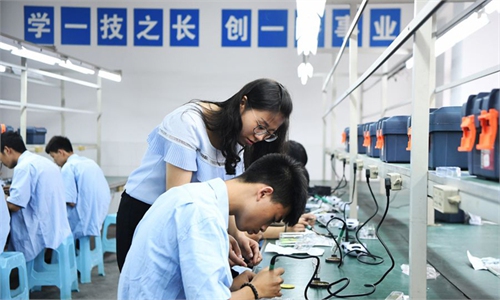China bids to strengthen vocational education amid a new wave of industrial transformation
More skilled workers will support high-tech manufacturing, competitiveness

A special campus job fair held at Zhenjiang Vocational Technical College on June 2, 2022, aiming to boost employment of new graduates and facilitate the resumption of work for local companies. Photo: IC
China has ramped up efforts to promote the development of its vocational education system, aiming to expand the nation's employment channels while cultivating more targeted talent for emerging high-tech industries, which is in line with the country's economic transformation.
The country has established the world's largest vocational education system, Chen Ziji, an official from the Ministry of Education said earlier. China currently has a total of 11,300 vocational education schools with more than 30 million students, data from the ministry showed.

The number of candidates taking the vocational college entrance exam and higher vocational school candidates who aim to become undergraduates has been growing in 2022, proving that the path to success for young Chinese talent is getting wider.
Support from government
The latest support measures came as Central China's Hubei provincial government released an implementation opinion on June 10 to promote high-quality development of local vocational education, which proposed to deepen and integrate the vocational educational system with industries and different types of educational systems while enhancing support for relevant schools and institutions in financing.
The revised Vocational Education Law came into force on May 1, which clearly defines that the vocational education in China is equally important as general education and states that China encourages the development of a variety of forms of vocational education, the Xinhua News Agency reported.
The revised version also stressed the significance of establishing a sound vocational education system, continuously deepening and integrating the education system with different industries, strengthen cooperation between schools and enterprises, and improve the system and measures to protect vocational education.
Higher vocational education schools usually establish close connections and cooperate with enterprises such as setting up special classes to cultivate corresponding talent for enterprises, Ding Ding, a staff member from the architecture engineering major of Changzhou Vocational Institute of Engineering in East China's Jiangsu Province told the Global Tines on Sunday.
Ding noted that students are able to participate in internships from matching enterprises during their studies and have the opportunities to become full-time workers at their chosen enterprises after obtaining degrees, which has relieved the employment pressure from students.
China has so far formed more than 1,500 vocational education groups and alliances covering more than 45,000 member units, including enterprises, schools, and industry and research institutions to conduct studies. Domestic vocational schools have built 24,900 internship training bases with enterprises, supported with loans, land and tax reduction, with an average annual increase of 8.6 percent.
Vocational schools and institutions across the country have also strengthened support for vocational education.
For instance, Chongqing College of Electronic Engineering (CQCEE) has established a dedicated mechanism and expanded cooperation channels with a number of enterprises, while making use of local resources such as the Chengdu-Chongqing economic circle in Southwest China, according to a statement sent to the Global Times by the CQCEE.
CQCEE has also stepped up efforts with its data analysis by taking advantages from various domestic educational data platforms to provide efficient services to students and enterprises. The enhanced digital capacity will consolidate employment data and realize real-time monitoring of the labor market.
Surging market demand
As multiple industries in China have been going through a crucial transformation and upgrading phase, vocational education has become an indispensable resource for cultivating more professionals, while market demand for the talent is increasing.
CQCEE plans to enroll 7,500 students in 2022, an increase of 100 students compared with 2021. The school's enrollment plan is employment oriented and closely aligned with Chongqing's goal in developing strategic smart industries such as Internet of Things, information security and management.
Zhang Yi, CEO of iiMedia Research Institute, told the Global times on Sunday that due to new supportive policies and market demand, the employment rate for vocational school graduates in 2022 saw a significant increase over previous years.
"One of the important advantages for vocational school graduates is that they can quickly pick up a job, or go through some simple guidance, which is welcomed by some employers," Zhang noted.
As China is ambitiously developing industries like intelligent manufacturing, talent graduating from vocational schools has advantages in the job market, Mao Yufei, a researcher from China Employment Research Institute under Renmin University of China told the Global Times on Sunday.
Ding said that students from higher vocational schools are favored by a lot of enterprises as they have a strong ability when it comes to practical skills, with specific and clear career path planned for the future.
Analysts meanwhile stressed the importance of continually improving standards and quality for vocational education, adding that enterprises meanwhile should also take professional skills into consideration on top of academic qualifications.
"To increase social acceptance of vocational education, normal universities should open more course or majors for vocational skills, and vocational education institutions could be allowed to provide more professional courses and issue graduates bachelor degrees," Zhang noted.
Mao noted that some enterprises still focus more on a candidate's education background but not their skills. "Education background should be a reference of candidates' ability of learning, but not a single benchmark for issuing their offers, employers should pay more attention on candidates' vocational skills," Mao said.
Mao said that an essential factor to vocational study is to improve the education standards such as set more discipline segment to meet demands from different aspects in intelligent manufacturing.
"The transformation of intelligent manufacturing is a jolt to boost vocational education for some extent, which would naturally help training institutions to increase their education scale and standards," said Mao.

